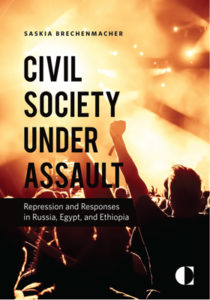The accepted narrative about Russia is simple: Vladimir Putin rules and a lemming-like society submits. The reality is more complicated, says Barbara von Ow-Freytag, a journalist, political scientist and adviser at the Prague Civil Society Centre. Despite crackdowns, Russia’s political and civil opposition is far stronger and more active than the West appreciates. But in order to thrive, it needs more consistent support, she writes for POLITICO:
 Over the past month, thousands of Russians have taken to the streets all over the country. Demonstrations have taken different forms, including local rallies against toxic landfills, urban flash mobs throwing paper planes to protest internet censorship, and nationwide protests decrying Putin’s czar-like grip on power…..
Over the past month, thousands of Russians have taken to the streets all over the country. Demonstrations have taken different forms, including local rallies against toxic landfills, urban flash mobs throwing paper planes to protest internet censorship, and nationwide protests decrying Putin’s czar-like grip on power…..
Vilnius has become a destination for Russian dissidents and Lithuania’s government has been welcoming, Deutsche-Welle’s Benas Gerdziunas reports:
 According to [former reporter Yevgeni] Titov, those who oppose the Kremlin have found an audience in the Baltic country. Lithuania’s president “Dalia Grybauskaite [left] is a star within the Russian opposition,” he commented….“While the Red Is On,”[above] a multimedia project by Nanook, a journalists’ collective, has documented Lithuania’s continuing draw for Russian dissidents. The title is based on a quote from Danil Konstantinov, a Russian nationalist who fled to Vilnius in 2016. Konstantinov claimed that “Russians do not pay attention to rules and regulations; it’s a form of freedom, a way to resist centuries-old state repression — for example, I always cross on the red light.”
According to [former reporter Yevgeni] Titov, those who oppose the Kremlin have found an audience in the Baltic country. Lithuania’s president “Dalia Grybauskaite [left] is a star within the Russian opposition,” he commented….“While the Red Is On,”[above] a multimedia project by Nanook, a journalists’ collective, has documented Lithuania’s continuing draw for Russian dissidents. The title is based on a quote from Danil Konstantinov, a Russian nationalist who fled to Vilnius in 2016. Konstantinov claimed that “Russians do not pay attention to rules and regulations; it’s a form of freedom, a way to resist centuries-old state repression — for example, I always cross on the red light.”

On the ideological front, Putin has reversed Gorbachev’s and Yeltsin’s reforms. Russia is a pseudo-democracy and de facto autocracy under one-man rule, notes Brookings analyst Strobe Talbott. Putin has more power than any Kremlin leader since Stalin. He is alone at the top of the “vertical of power.”
Putin’s authoritarianism has shrunk the space for civic activism, Freytag adds:
Despite this crackdown, Russian civil society has shown an impressive ability to adapt. A 2017 study by the Centre for Economic and Political Reform shows a significant increase in protests throughout the country — even if outright political rallies remained rare. Of a total of 1,100 protests staged between January and September 2017, about three-fourths concerned local socio-economic issues such as unpaid wages, layoffs, closures of industrial plants and pollution.
 Despite fierce Kremlin anti-Western propaganda, prominent human rights activists such as Ludmilla Alexeeva [left- a recipient of the National Endowment for Democracy’s 2004 Democracy Award] have called on the West to uphold its support and solidarity, Freytag notes.
Despite fierce Kremlin anti-Western propaganda, prominent human rights activists such as Ludmilla Alexeeva [left- a recipient of the National Endowment for Democracy’s 2004 Democracy Award] have called on the West to uphold its support and solidarity, Freytag notes.
Many western experts see Putin himself as the reason for problems past and present, CSIS notes. What, then, does his continued rule mean for U.S. Russian relations, and how might each country adjust its policies to better further domestic, foreign policy, and security goals? The Center for Strategic and International Studies and the Institute of Modern Russia sponsor a discussion on “America, Russia, and Vladimir Putin: Russian Opposition Perspectives.”
 Speakers: former Russian Foreign Minister Andrei Kozyrev; Vitali Shkliarov, political strategist and former senior campaign adviser to Ksenia Sobchak; Vladimir Kara-Murza (right), vice chairman of Open Russia; and Olga Oliker, director of the CSIS Russia and Eurasia Program.
Speakers: former Russian Foreign Minister Andrei Kozyrev; Vitali Shkliarov, political strategist and former senior campaign adviser to Ksenia Sobchak; Vladimir Kara-Murza (right), vice chairman of Open Russia; and Olga Oliker, director of the CSIS Russia and Eurasia Program.
June 14, 2018. 2:30 p.m.
Venue: CSIS, 1616 Rhode Island Avenue NW, Washington, D.C.







